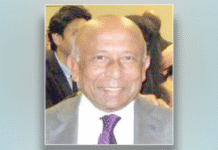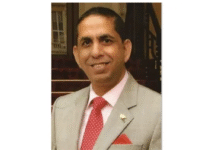Abu Hena
Sammilito Islami Dalsamuho, a platform of different Islamic organizations observed dawn –to dusk country–wide hartal on Sunday, 26 October, demanding arrest of Latif Siddique, the sacked minister of Sheikh Hasina’s hydra-headed cabinet and ousted member of Awami League Presidium, party’s highest policy making forum.
The alliance announced fresh protest program on Friday to be launched from the country’s mosques to drive home their demand. Various district courts of the country have issued warrant of arrest against the offender who suddenly came out with uncalled for derogatory remarks against Prophet Muhammad (sm) and eviscerated the holy institution of the Hajj.
Latif Siddique accompanied Prime Minister Sheikh Hasina as the senior most member of herunwieldy 185 member entourage to the UNGA which comprised 7 Ministers, 2 Advisers, 3 MPs, 18 ruling party officials, 15 officials from PM’s office, 8 from Foreign Ministry and 11 from other ministries, 20 security personnel, 13 members of PM’s media team, 10 other media personalities and 75 businessmen. The Permanent Mission of Bangladesh to the UN booked 80 luxurious rooms at the expensive Hotel Grand Hyatt on Park Avenue in New York. Sources said the cost of each member would be between Tk 3 lakh and Tk 5 lakh.
Such was the grand setting from which Latif Siddique, the senior most member of Sheikh Hasina’s mishmash cabinet delivered his well – planned and well publicized anti- Islamic canards which caused consternation and dismay to the 1.5 billion Muslim Umma who live mainly in 57 OIC countries and most other countries of the world including India which is home to 180 million Muslims. He chose to hit at the sacred institution of Hajj at a time when 2 million Muslims were performing Hajj in Makkah. He did with a purpose to belittle Islam and to please others who relish and encourage such nonsense. Pilgrimages are common to all religions.Most of the world’s great religious centers, past and present,have been the destinations for pilgrimages –think of the Vatican, Jerusalem Budh Gaya (where Buddha was enlightened).
Excellent pattern of nation-building
Hajj, the fifth pillar of Islam is somewhat different from other pilgrimages as it involves a complete transformation of the individual’ life within a space of few days. Muslim’s worship really begins with the concept of ‘ihsan’ or realization. It implies that a person is really making a conscious effort to be in communication with God.
Indeed Islam has provided an excellent pattern of nation- building which resembled the nation – building process as was envisaged by Confucius: To put the world right in order, we must first put the nation in order; we must first put the family in order; we must first cultivate our personal life and must first set our hearts right.” The Qur’an has assured mankind that from those who invite others to all that is good, enjoining what is right and forbidding what is wrong: “And let there be from you a nation inviting to good, enjoining what is right and forbidding what is wrong, and those will be successful.” [3:104]
The Hajj, along with other obligatory four pillars of Islam play an important role in maintaining the sense of belonging to a community. They create the link not only with those who perform them but also between generations. The idea of silsila, a chain of witnesses stretching from the Prophet to the end of the world, and handing on the truth by direct transmission from one generation to another, is vital in Islamic culture.
Kaba: World’s first shrine for God’s worship
According to Muslim belief, the first shrine of the Ka’ba ( also known as Bait al – Haram – the Holy House ) was built by the first human, Adam, and is therefore the first shrine for worship of God on earth. Adam and Eve were cast out of Paradise and obliged to wander over the earth in grief, hardship and pain. When they were forgiven by God they were united on the plain of Arafat, where there is a small hill, Mount Arafat, also known as Jabal-e- Rahman, the Mount of Mercy. Abraham ( Ibrahim) rebuilt the Ka’ba with the help of his son Ismail and wife Hajarah. Following God’s wish, in a dream, to sacrifice his son Ismail, Ibrahim was about to sacrifice his son.
At that moment God prevented him and told him that he had long fulfilled the purpose of the dream, i.e. to show his obedience. A ram was sacrificed instead, and became the historical basis for the tremendous sacrifice “of Eidul Azha”. Here Hajarah was tested again. When her son was dying of thirst she ran seven times between Safa and Marwa in search of water. When she returned she found to her surprise that angel Gabriel had already opened a spring in the midst of the vast desert at the hitting of the feet of her son. The well is now called Zamzam and the holy water is now drank in full by all pilgrims. On return from Arafat the pilgrims run seven times between Safa and Marwa to commemorate the miracle that happened 4000 years ago. It symbolizes the soul’s desperate search for that which gives true life.
Latif Siddique: Frankenstein monster
Latif Siddique is the Frankenstein monster who has been created and brought to life by Awami League’s so- called culture of secularism which aggressively professes and propagates a distorted view of Islam which is the religion of 150 million Muslims of this country. Latif Siddique who remained a member of Awami League for long fifty years has clearly stated that following the expunging of the word ‘Muslim’ from the AL nomenclature he was free to express all kinds of remarks against Islam, its Prophet and its institutions.
He also stated firmly that his remarks were fully in conformity with Awami League’s constitution and declaration, principles and policies. Awami League also deviated from the ideals declared in the Proclamation of Independence of 10 April 1971 which stated: “In order to ensure for the people of Bangladesh equality, human dignity and social justice, declare and constitute Bangladesh to be a sovereign People’ Republic and thereby confirm the declaration of independence already made by BangaBandhu Sheikh Mujibur Rahman, and hereby affirm and resolve that till such time as a Constitution is framed …”
Unfortunately, the 1972 Constitution totally ignored the basic principles laid down in the Proclamation of Independence for which the War of Independence was fought to create the sovereign People’s Republic of Bangladesh. There was no such word as ‘secularism’ in the Proclamation of Independence.
The writer was a Member of Parliament from 1996 to 2006
Source: Weekly Holiday









